474
The 12 major food problems
Almost everyone today is involved in the debate about nutrition and food. These topics are discussed in the narrow public and political circles. Labeling genetically modified food, taxes on soda, health care reform -all these issues revolve around the food all around the world.
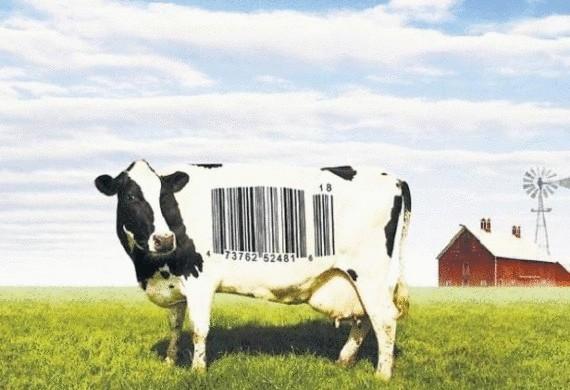
Let's look at the biggest problems of food production in the modern world ( and how they affect us).
Food = Politicalpolitical and social activists to discuss issues of obesity in the world. You may think that the choice of dishes entirely a matter of personal responsibility, and that the food industry has no real effect on your diet, and that the government was not involved in this business and it has nothing to do with your personal choice in the diet.
And, perhaps, on the other hand, you recognize that food has a powerful effect on the environment. And this fact affects your personal food choices.
In any case, the government may place some restrictions on the marketing practices of the food industry.
Modern product marketing
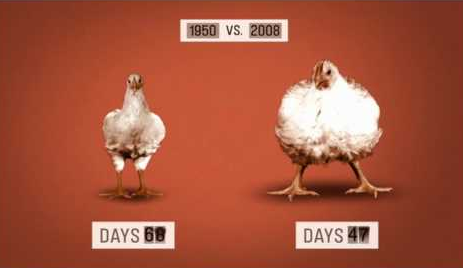
The prevalence of obesity worldwide began to grow rapidly since the early 1980s. Since then, as our food has changed, we eat it in more places, with more frequency and in bigger portions. In particular, these changes in society occurred as a result of the increasing frantic pace of modern life.
Food Hunger
Sometimes it's hard to believe, but even in the richest countries, millions of children live in poverty and dependent on benefits and public opinion. It is not only about how to reduce the gap in incomes, education, health and cultural values between the haves and the have-nots, but whether to do it at all. Because this argument depends on many factors and becomes a policy matter. As with many other nutritional problems, the question of increasing state aid becomes dependent on who you are.
The effect of the different countries for the diet Changes in the world economy, which enables some segments of the population is better and to follow the path of the Americans. As in the US, we buy unhealthy high-calorie foods, gain weight and become fat. As soon as our economy improves, the number of obese people increases to increased food security, and soon exceed it.
Problems of food production
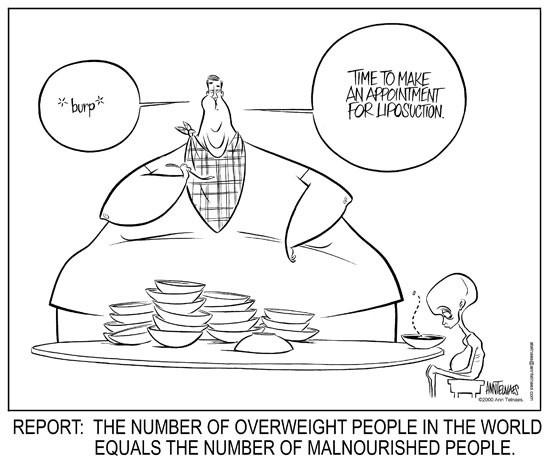
But why some people like us seem to gain weight easier than others? Genetics definitely is a factor, but genetics do not have time to change the Americans and they began to gain weight in the 1980s. the Factor of change was the nutritional environment. Since the early 1980-ies, the food has become more widespread. The proliferation of fast foods. The portion sizes of food increasing. People began to eat out more often snacking. This is why obesity is a particular problem for cartoonists. They can quickly draw enormous bellies to illustrate the personal factors that contribute to obesity, but to outline the impact on the environment is much more difficult to characterize.
Childhood obesity the effects of food marketing to weight children go beyond advertising. Large food companies are using increasingly sophisticated ways to promote their products, with the mission of "social responsibility". They support scientific studies that demonstrate that products do not affect body weight (independent research, tend to come to different conclusions)... They also do great charitable community sports and health, involving hospitals and orphanages. Perhaps you believe that it is unfair to attribute obesity to marketing impact of the food industry, when the real problem is overly permissive parenting.
Genetically modified foods One aspect of the debate about GMOs is self-evident. In many countries, consumers just have no choice. Genetically modified foods are not labeled.
And in our country labeling GMO free is very relative.
Feeding children is a policy
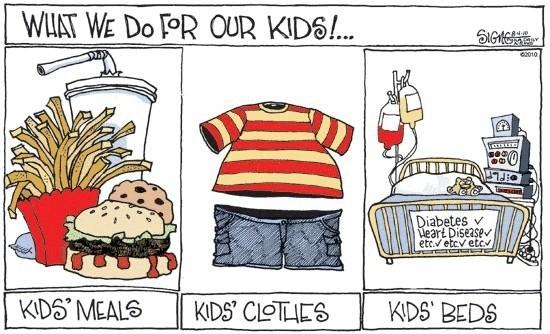
You have not addressed the issue of school meals from a political point of view, but each school provides students with breakfasts and Lunches. This is a niche for large industry to try to get and earn more and more companies. Nevertheless many children go hungry during school hours. Any company involved in the provision of food for school Lunches and beverage — wants his share of the money.
Food labels that confuse Any trip to the supermarket is filled with products loaded with sugar, saturated fats, salts, and extra calories, all contributes greatly to increased profits for manufacturers and sellers if it were not for the people who eat them. Buyers can say what they want to eat healthy, but many people are confused about the recommendations of nutritionists and complicated ingredient lists. Marketers are in turn skillfully used this confusion.
Corporate Greed
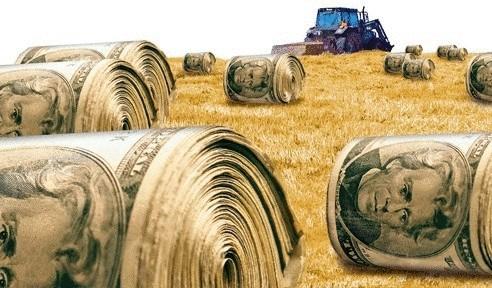
In many stores, entire aisles dedicated to fizzy drinks, appetizers, cookies, candies, and sweet dry breakfasts. All these products are manufactured from inexpensive ingredients and are advertised with huge budgets. They made one of the largest food corporations in the world and their marketing, of course, always looking for ways to reduce costs and increase profits.
Ignoring climate change
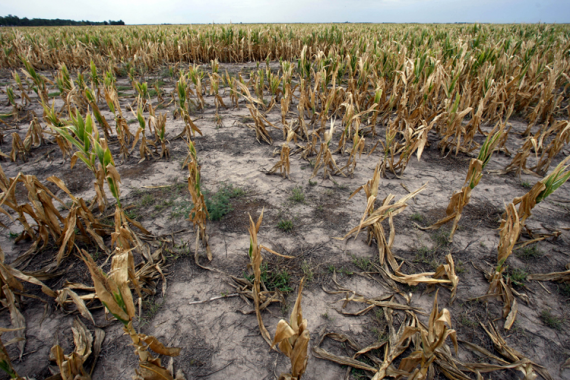
Although it may seem self-evident that the climate is getting warmer and the weather more extreme, some people believe that these trends have nothing to do with human industrial or agricultural activity, and that there is no need to try to reduce the impact of agriculture on climate.
However, scientists claim that the level of greenhouse gases is so high that damage to agricultural production is inevitable. They predict that global warming will lead to more frequent extreme weather conditions such as droughts that will affect agriculture in many countries. If politicians can't take action, ordinary citizens will have to do instead.
As evidenced by the growing number of vegetarians, raw foodists and conscious consumers
Feeding hope in Spite of personal and environmental barriers to healthy eating, more and more people aimed at improving food system. This movement is fragmented and decentralized, consisting of hundreds of niche groups that natselenny to improve health, food security, prevention of obesity and food safety. Many groups want to turn the industrial food production system that is more sustainable, local and organic; kinder to farm animals; and are honest and fair in relation to agricultural workers.
One common goal unites these groups: create a food system that is healthier for people and the planet. The participants of this movement vote with their forks every time they make a variety of dishes.
Source: rodovid.me

Let's look at the biggest problems of food production in the modern world ( and how they affect us).
Food = Politicalpolitical and social activists to discuss issues of obesity in the world. You may think that the choice of dishes entirely a matter of personal responsibility, and that the food industry has no real effect on your diet, and that the government was not involved in this business and it has nothing to do with your personal choice in the diet.
And, perhaps, on the other hand, you recognize that food has a powerful effect on the environment. And this fact affects your personal food choices.
In any case, the government may place some restrictions on the marketing practices of the food industry.
Modern product marketing

The prevalence of obesity worldwide began to grow rapidly since the early 1980s. Since then, as our food has changed, we eat it in more places, with more frequency and in bigger portions. In particular, these changes in society occurred as a result of the increasing frantic pace of modern life.
Food Hunger
Sometimes it's hard to believe, but even in the richest countries, millions of children live in poverty and dependent on benefits and public opinion. It is not only about how to reduce the gap in incomes, education, health and cultural values between the haves and the have-nots, but whether to do it at all. Because this argument depends on many factors and becomes a policy matter. As with many other nutritional problems, the question of increasing state aid becomes dependent on who you are.
The effect of the different countries for the diet Changes in the world economy, which enables some segments of the population is better and to follow the path of the Americans. As in the US, we buy unhealthy high-calorie foods, gain weight and become fat. As soon as our economy improves, the number of obese people increases to increased food security, and soon exceed it.
Problems of food production

But why some people like us seem to gain weight easier than others? Genetics definitely is a factor, but genetics do not have time to change the Americans and they began to gain weight in the 1980s. the Factor of change was the nutritional environment. Since the early 1980-ies, the food has become more widespread. The proliferation of fast foods. The portion sizes of food increasing. People began to eat out more often snacking. This is why obesity is a particular problem for cartoonists. They can quickly draw enormous bellies to illustrate the personal factors that contribute to obesity, but to outline the impact on the environment is much more difficult to characterize.
Childhood obesity the effects of food marketing to weight children go beyond advertising. Large food companies are using increasingly sophisticated ways to promote their products, with the mission of "social responsibility". They support scientific studies that demonstrate that products do not affect body weight (independent research, tend to come to different conclusions)... They also do great charitable community sports and health, involving hospitals and orphanages. Perhaps you believe that it is unfair to attribute obesity to marketing impact of the food industry, when the real problem is overly permissive parenting.
Genetically modified foods One aspect of the debate about GMOs is self-evident. In many countries, consumers just have no choice. Genetically modified foods are not labeled.
And in our country labeling GMO free is very relative.
Feeding children is a policy

You have not addressed the issue of school meals from a political point of view, but each school provides students with breakfasts and Lunches. This is a niche for large industry to try to get and earn more and more companies. Nevertheless many children go hungry during school hours. Any company involved in the provision of food for school Lunches and beverage — wants his share of the money.
Food labels that confuse Any trip to the supermarket is filled with products loaded with sugar, saturated fats, salts, and extra calories, all contributes greatly to increased profits for manufacturers and sellers if it were not for the people who eat them. Buyers can say what they want to eat healthy, but many people are confused about the recommendations of nutritionists and complicated ingredient lists. Marketers are in turn skillfully used this confusion.
Corporate Greed

In many stores, entire aisles dedicated to fizzy drinks, appetizers, cookies, candies, and sweet dry breakfasts. All these products are manufactured from inexpensive ingredients and are advertised with huge budgets. They made one of the largest food corporations in the world and their marketing, of course, always looking for ways to reduce costs and increase profits.
Ignoring climate change

Although it may seem self-evident that the climate is getting warmer and the weather more extreme, some people believe that these trends have nothing to do with human industrial or agricultural activity, and that there is no need to try to reduce the impact of agriculture on climate.
However, scientists claim that the level of greenhouse gases is so high that damage to agricultural production is inevitable. They predict that global warming will lead to more frequent extreme weather conditions such as droughts that will affect agriculture in many countries. If politicians can't take action, ordinary citizens will have to do instead.
As evidenced by the growing number of vegetarians, raw foodists and conscious consumers
Feeding hope in Spite of personal and environmental barriers to healthy eating, more and more people aimed at improving food system. This movement is fragmented and decentralized, consisting of hundreds of niche groups that natselenny to improve health, food security, prevention of obesity and food safety. Many groups want to turn the industrial food production system that is more sustainable, local and organic; kinder to farm animals; and are honest and fair in relation to agricultural workers.
One common goal unites these groups: create a food system that is healthier for people and the planet. The participants of this movement vote with their forks every time they make a variety of dishes.
Source: rodovid.me
How to make a bridge on the pond with his hands
Siberian chemists developed animal antibiotic of new generation























